 |
Tyler Texas Economy, Business, and Employment
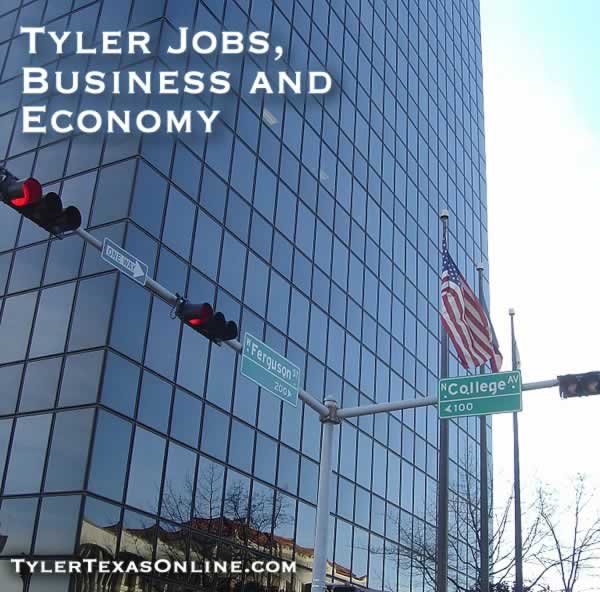 Financial center, downtown, Tyler (TylerTexasOnline staff photo) |
Tyler and the East Texas job market employ a large number of jobs and careers in the manufacturing, healthcare, education, grocery distribution, banking, retail business, information technology, communications, oilfield, petrochemical, natural gas, drilling, and refining job sectors.
About 112,000 jobs are located in Smith County.
The workforce consists of thousands of accountants, information technology workers, communications specialists, restaurant employees, hotel workers, bankers, retail sales personnel, health care workers, welders, roughnecks, drillers, truck drivers, oilfield rig mechanics, electricians, and dozens more jobs and occupations in the Tyler job market.
Even in difficult economic times nationally, employment and job search opportunities in Tyler have remained strong, and better than much of the US.
Tyler has been ranked in the top 10 “Best Performing Small Cities” by the Milken Institute.
 |
Employers in the Tyler Texas Area
Major job markets in 2026 include the oil & gas industry, medical sector, manufacturing, education, grocery distribution, retail distribution, air conditioning equipment manufacturing and banking.
Tyler features a large, state-of-the-art healthcare and medical community, built around a series of major hospital and clinic systems, including the UT Health East Texas (formerly ETMC) and CHRISTUS Trinity Mother Frances Health System, that serve all of the East Texas region.
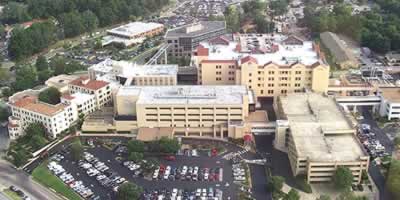 CHRISTUS Trinity Mother Frances campus in Tyler (Photo courtesy of TMF) |
Both hospital systems are the largest job employers in the Tyler area, each with over 4,000 employees.
The Brookshire Grocery Company and Cavender's Boot City both have their corporate headquarters in Tyler. Other major employers include the University of Texas at Tyler, Tyler Junior College, The Trane Company, UT Health Center at Tyler, Optimum, Target Distribution Center, Tyler Pipe, John Soules Food, Sanderson Farms, Delek Refining, Fresenius and Southside Bank.
In addition, public entities including Smith County, the City of Tyler, and the Tyler Independent School District (TISD) employ thousands of workers.
East Texas oil & gas employers include a wide array of companies such as Halliburton, BJ Services, Chesapeake Energy Corporation, Baker Petrolite, Cudd Pressure Control, Delek Refining, Eastman, Weatherford International, and hundreds of other small, and large, corporations.
Tyler's long association with the rose and nursery industry provides additional stability and growth, and jobs.
The Tyler Economy
Even in difficult economic times, Tyler's diverse economy remains robust in 2025 with its base in the manufacturing, retail, oil & gas, education and health care industries. Employment is stable, and better than much of the US. The City of Tyler has successfully dealt with declines in tax revenues without substantial cuts in public services.
The up-to-date Tyler Pounds Regional Airport provides rapid connections to all of the country for both business travel and leisure travel.
Business & Economic Development
The Tyler Economic Development Council (TEDC) is a non-profit organization that promotes the creation and retention of primary jobs for Tyler and the diversification of the economic base to expand employment opportunities in the region.
Benefitting from a strong labor force and excellent local infrastructure, TEDC has assisted in the creation and retention of over 27,000 jobs since its inception in 1989 and generated over $1.26 billion in new investment in the Tyler area during that time.
Current projects of TEDC and its partners include these:
- Tyler Industrial Park
- Bioscience Park
- Tyler Business & Technology Park
Finances and Budget
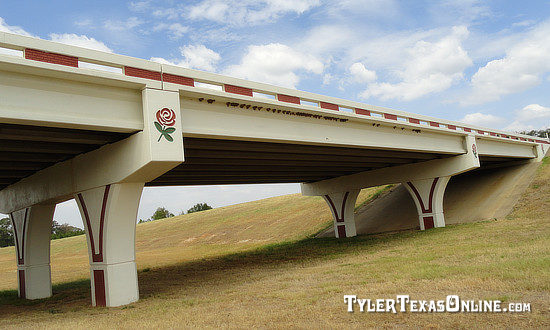 Completed overpass on Toll Loop 49 in Tyler (TylerTexasOnline Staff photo)) |
Texas is one of the few states with a healthy budget. The positive implications of balanced budgets for Texas, and Tyler, are huge. The City of Tyler continues to have a balanced budget and an excellent bond rating.
Tyler Population Growth
According to the Federal 2020 Census, the population of Tyler is 105,995, and the population of Smith County is 233,479. Also, the Census Bureau is estimating the population of Tyler as of July, 2022, to be 109,286 residents.
Tyler has not been caught up in the unrealistic real estate markets that have plagued other parts of the nation. Most Texas banks retain conservative banking principles.
In-migration continues for Texas and Tyler, and more residents are added on a regular basis.
Read more population figures at the Census.gov Quick-Facts Report for Tyler
Tyler Long-Range Plan
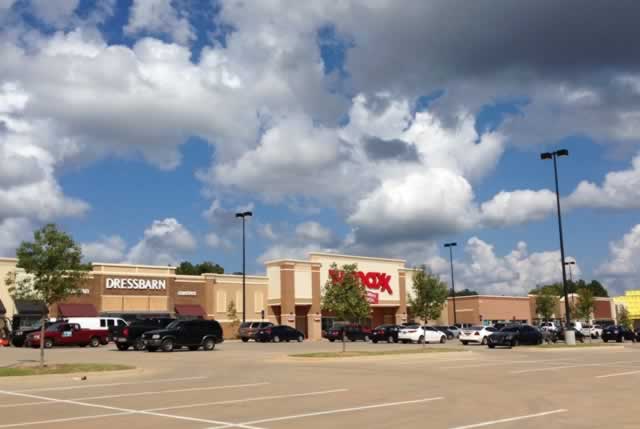 Scene at the The Village at Cumberland Park, Tyler, Texas, on the South Broadway Corridor (TylerTexasOnline staff photo) |
The Tyler 1st Comprehensive Plan, formerly known as Tyler 21, was launched in 2007. The plan addresses downtown revitalization, historic preservation, parks and recreation, transportation, housing and neighborhoods. The comprehensive plan is reviewed every five years and completely updated every 20 years. Read details about Tyler 1st
The Tyler 1st Plan will be updated after a new Community Survey is completed.
South Broadway Avenue Growth Corridor
Growth continues at a solid pace in the Tyler area, especially along the South Broadway Avenue corridor (U.S. 69) and Loop 323, with new restaurants such as Chuy's, Saltgrass Steak House, Abuelo's, Walk-Ons, and others providing more job growth.
Jobs and tax revenue from retail outlets on South Broadway such as Kohl's and Target, and hospitality industry growth from the new Residence Inn by Marriott provide for more growth in this area.
In 2014, the Broadway corridor extended even further south, to Toll 49, with the opening of the huge Village at Cumberland Park shopping area.
Old Jacksonville Corridor
The Old Jacksonville Highway corridor is experiencing exponential growth, and features exciting new businesses such as Swann's Furniture Gallery, Cavender's corporate offices, several banks, Wagner Cadillac, and FRESH by Brookshire's.
Developments such as Legacy Bend, The Crossing, Oak Hollow, Oak Hills, The Heights, and Cumberland Ridge continue to enhance the "New Jacksonville" area.
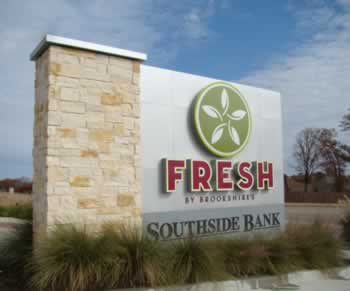 FRESH by Brookshires, Tyler, Texas (TylerTexasOnline staff photo) |
The Old Jacksonville corridor continues to extend south, to Gresham and then Flint and Bullard.
In short, Tyler has in the past, and will continue to survive, and thrive, in the current economic situation far better than other areas.
For more detailed, current information, we recommend you contact the Tyler Area Chamber of Commerce and the Tyler Economic Development Council.